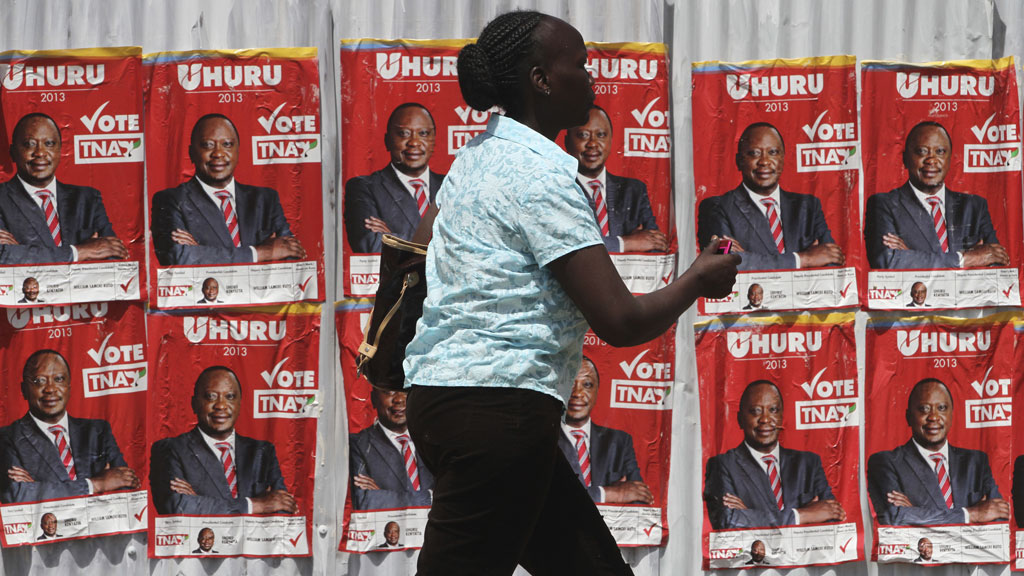Kenya’s elections and the language of peace – debate
 Jamal Osman
Africa Correspondent
Jamal Osman
Africa Correspondent
As Kenya readies itself to go to the polls, watch our Google Hangout with Jamal Osman and guests as they look ahead to the Kenyan elections.
Next week, Kenya will go to the polls to elect a new leader. It is one the most important elections in the country’s history.
What happened in the last election, five years ago, makes everyone nervous. Allegations of corruption and vote rigging caused ethnic violence. Some 1,200 people were killed and more than half a million displaced.
For now, Kenyans seem to have learned from that experience. Politicians and journalists, who were blamed for inciting the post-election violence in 2008, are now using the language of peace.
Religious figures are holding peace rallies. A fresh election commission, a new constitution and reformed judiciary should also help.
Fears of violence re-erupting
However, there’s still tension, uncertainty and fear that the violence may erupt again. And there are few contentious issues.
Some of these were discussed in the two presidential debates held in this month. In eagerly anticipated debates, the candidates went head to head to explain their policies. Watched by millions, the debates were broadcast live on all the major Kenyan media.
The candidates’ alleged roles in the post-election violence in 2008 became the main issue in the first debate.
Four Kenyans, including one of the favourites, Uhuru Kenyatta, and his deputy William Ruto, are wanted by the International Criminal Court (ICC).
Uhuru’s rival candidates questioned how, if elected, he could run the country and, at the same time, deal with the ICC case.
Could ‘damage Kenya’s relations with the west’
Many say it will prevent him from his duty and could damage Kenya’s relations with the west. But his supporters say the ICC proceedings are politically motivated and they may not accept the result if it doesn’t go their way. And with Kenya’s societies divided through ethnic lines, this is a worry.
Insecurity is another potential threat to Kenya. Land disputes, Kenya’s involvement in Somalia and social problems like unemployment are all believed to be contributing factors.

In particular, land ownership remains one of the most controversial issues in Kenya. Growing population of landless indigenous communities are now being manipulated by various political groups, especially in the coast region – attractive to tourists, the region is a vital part of Kenya’s economy.
Locals say they are being systematically driven out of their homes and off their land by corrupt officials looking to cash in on prime real estate. Thousands of people have officially been moved off the land in the area.
In October 2011, Kenya invaded Somalia to fight al-Shabab, an al-Qaeda linked Islamist group in Somalia and has taken control over Kismayo, a strategic port city.
Al-Shabab blamed for bombings
Since then, there have been a series of bombings in Nairobi and Mombasa. Al-Shabab and their supporters are blamed on these attacks. In response, the Kenyan government targeted Somalis, many of them Kenyan citizens, and that is antagonising the community.
But the west will not watch Kenya disintegrate into a state of chaos. The country is politically and economically a strategic place for the US and Europe.
In a volatile east Africa region, Kenya is generally seen as a stable nation. It is also an ally of the west in the war against al-Qaeda and has played a role in pushing back the rise of al-Shabaab, a group linked to al-Qaeda.
Economically, European countries have invested heavily in Kenya’s tourism and is an attractive destination for many western holidaymakers. They also have interest in other areas like agriculture, telecommunications and banking.
However, due to fear of ethnic clashes during or after the election, many of the foreigners working in Kenya have relocated temporarily. The tourism industry has been badly affected and the whole country appears to be on hold. Everyone is waiting the election to pass peacefully.
-
Latest news
-
Taylor Swift’s new break-up album breaks records3m

-
NHS trust fined £200K for failings that led to death of two mental health patients3m

-
Sunak vows to end UK ‘sick note culture’ with benefit reform3m

-
‘Loose talk about using nuclear weapons is irresponsible and unacceptable’, says head of UN’s nuclear watchdog3m

-
‘There wasn’t an Israeli attack on Iran,’ says former adviser to Iran’s nuclear negotiations team7m

-




